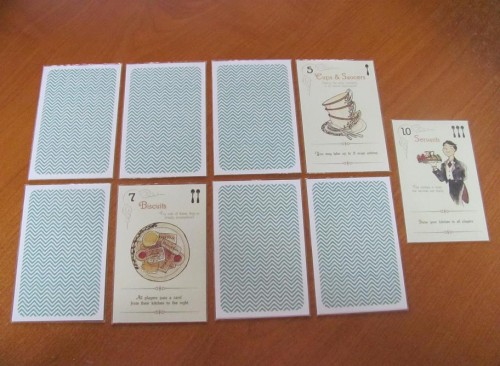Welcome to Purple Pawn, covering games played around the world by billions of people every day.
Elevenses is a card game in which players try to outdo each other at hosting morning tea. Currently seeking funding on Kickstarter, Elevenses is a game that feels just right for a tea party—interesting, thoughtful, and interactive but not too heavy. It also makes the most thematically-fitting use of wooden cubes that I’ve seen yet.
The recipe for Elevenses balances a little strategic decision-making with a dash of take-that and a hint of memory-game. There are just a few different cards and all players start with the same set. Thus, card-play is mostly about timing. Each round, eight cards are randomly placed faced-down on the table in two rows of four—this is a player’s tablecloth—and three are left for the hand—called a player’s kitchen.
To play a card on a turn, a player places it face-up in it’s designated space on the tablecloth, the card that was there goes in to the player’s hand, and then the player follows the instructions on the played card. The number 6 card (“Fine China”), for example, instructs all players to pass a card to the left. The number 9 card reads, “Choose a player. She looks at your kitchen and may swap for a card.”
In addition to its instructions and position number, each card has a teaspoon value. At the end of a round, which is when one person plays a number 11 card, the one with the most face-up teaspoons takes two sugar cubes (wood cubes painted white) and the one with the second-most takes one. The first to seven cubes is the winner.
Two cards, the number 1 (“Tea Trolley”) and number 10 (“Servants”), are actually played without retrieving new cards from the tablecloth to replenish one’s kitchen. Yet, they’re also the most valuable—one is worth 3 teaspoons, the other automatically gives a sugar cube to the one who played it. The challenge with them, then, is to balance teaspoon-value with flexibility.
Similar tradeoffs in the game exist between playing for high teaspoon-value or playing to end the round early, manipulating the cards of opposing players or focusing on one’s own cards, and playing opportunistically or strategically. In any case though, rounds end quickly, providing lots of opportunity to adjust play and adopt to the styles of other players.
Supporting Elevenses on Kickstarter at just $20 Australian includes a copy of this cute little social game shipped anywhere in the world.
1 Comment
Sorry, the comment form is closed at this time.
Trending
- Massdrop.com
- Oh the Irony—Illuminati Card Game Continues to Inspire Conspiracy Theorists
- Home
- Footprints, an Educational Ecology Game
- USPS Adds Board Game Flat Rate Box
- Baila, the Estonian Drinking Card Game
- Crystal Caste Wins Dice Patent Suit Against Hasbro
- Mirror Game, Red and Blue
- Are Board Games Dangerous?
- The Truth About Dominoes On Sunday in Alabama
Archives
Most Popular Articles
- Oh the Irony—Illuminati Card Game Continues to Inspire Conspiracy Theorists
- The 20 Most Valuable Vintage Board Games
- The Truth About Dominoes On Sunday in Alabama
- Sequence Game, and Variants
- USPS Adds Board Game Flat Rate Box
- Baila, the Estonian Drinking Card Game
- The 13 Most Popular Dice Games
- Are Board Games Dangerous?
- Guess Who? The Naked Version
- What Happened to the Jewel Royale Chess Set?
Recent Posts
- Toy Fair 2019—Breaking Games
- Talisman Kingdom Hearts Edition
- Toy Fair 2019—Winning Moves
- Toy Fair 2019—Games Workshop
- Toy Fair 2019—Star Wars Lightsaber Academy
- Toy Fair 2019—Stranger Things Games
- Toy Fair 2019—HABA
- Licensing Roundup
- Game Bandit
- 2018 A Difficult Year For Hasbro But Not For D&D Or MtG
Recent Comments
- on Toy Fair 2019—Winning Moves
- on Game Bandit
- on Second Look—Dungeons & Dragons Waterdeep Dragon Heist
- on Crowdfunding Highlights
- on Beyblade SlingShock
- on Game Bandit
- on Game Bandit
- on Watch This Game!, the Board Game Review Board Game
- on Second Look—Vampire: The Masquerade 5th Edition
- on Palladium Books Loses Robotech IP License, Cancels Five-Year-Overdue Robotech RPG Tactics Kickstarter






Hi David! Thanks so much for this great review about Elevenses! It’s so fun to read this and staring at my own illustrations haha. :)